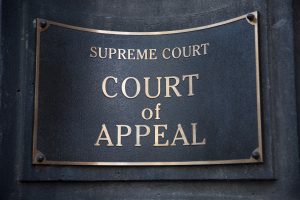 Every person charged with a crime in the United States is entitled to a speedy trial. This is a federal constitutional right guaranteed by the Sixth Amendment to the United States Constitution which states, [i]n all criminal prosecutions, the accused shall enjoy the right to a speedy and public trial…” The State of Florida also made this a state constitutional right in Section 16 of the Florida Constitution, which states that in all criminal prosecutions the accused shall, upon demand…shall have the right…to have a speedy and public trial…
Every person charged with a crime in the United States is entitled to a speedy trial. This is a federal constitutional right guaranteed by the Sixth Amendment to the United States Constitution which states, [i]n all criminal prosecutions, the accused shall enjoy the right to a speedy and public trial…” The State of Florida also made this a state constitutional right in Section 16 of the Florida Constitution, which states that in all criminal prosecutions the accused shall, upon demand…shall have the right…to have a speedy and public trial…
The Florida Supreme Court adopted Florida Rule of Criminal Procedure 3.191, which provides that every person charged with a crime be brought to trial on a misdemeanor within 90 days of arrest on a misdemeanor and within 175 days of arrest on a felony. The Rule states that the time period commences when the person is taken into custody, which is defined as “when the person is arrested as a result of the conduct or criminal episode that gave rise to the crime charged;” There are exceptions to these timeframes and the most common exception is when the person charged waives their right to a speedy trial. There are valid reasons to waive that right. Basically, a person is not entitled to have their cake and eat it too. In other words, a person charged with a crime is going to need time to investigate the case, to potentially take depositions, to conduct legal research, to file motions and have motion hearings, and to otherwise conduct pretrial negotiations and/or litigation. So, if a person demands a speedy trial, that person is necessarily not going to have additional time to prepare a defense. So, in most cases, a person charged is going to move to continue the case to allow for preparation. However, what happens when the time has expired before the person has waived his or her right to a speedy trial?
In State v. Williams, Ms. Williams was arrested on October 8, 1999. The State filed formal charges on May 3, 2000, which was 206 days after her arrest. Ms. Williams filed a motion for discharge alleging that the State failed to bring her to trial within the time allowed by Florida Rule of Criminal Procedure 3.191. Under subsection (p)(3), the defendant can file a notice of expiration of speedy trial and then the trial court must conduct a hearing within five days and set the case for trial within 10 days. This is referred to as the “recapture period.” So, the trial judge treated the motion for discharge as a notice of expiration of speedy trial and held a hearing and scheduled the case for trial within 10 days. Ms. Williams objected, arguing that she should have been discharged because the time frame had expired.

On appeal, the issue was whether the speedy trial time period is tolled when the speedy trial time period expired before the State files formal charges. The Florida Supreme Court held that the State is not entitled to a recapture period when the speedy trial time period has run prior to filing charges.
More recently, the Florida 5th District Court of Appeals decided Robinson v. State. In Robinson, the 5th DCA certified a question to the Florida Supreme Court asking it to reconsider the Williams decision, which in the 5th DCA’s opinion provides for the harsh result of discharge. Mr. Robinson had an outstanding warrant for his arrest out of Duval County. FDLE agents contacted Suwannee County local officers to coordinate taking Mr. Robinson into custody on that warrant in Suwannee County. Mr. Robinson was arrested by FDLE agents and Suwannee County officers approached within about 10 seconds. The FDLE agents told the Suwannee County officers that there were controlled substances in plain view in Mr. Robinson’s car. The Suwannee County officers searched Mr. Robinson’s car and located controlled substances and firearms in his car and controlled substances on his person.
Mr. Robinson was charged in Suwannee County with the controlled substances and firearms offenses. He pled guilty and served a 20 month sentence on the Suwannee charges. It wasn’t until he was about to be released that he was transported to Duval County to face prosecution on the charges that led to the arrest warrant, which was an attempted murder charge. Mr. Robinson filed a motion for discharge arguing that he wasn’t brought to trial within 75 days of his arrest and therefore the case should be dismissed. The trial judge denied the motion finding that Mr. Robinson wasn’t arrested on the arrest warrant, but rather was arrested on the Suwannee County controlled substance and firearms charges.

On appeal, the 5th DCA analyzed the four Melton factors to determine whether Mr. Robinson was taken into custody for purposes of the Rule. All four must be present. In Melton v. State, the Florida Supreme Court laid out four elements the court must consider to determine whether an arrest was made on the offense in question. First, the court should look at the purpose or intention to effect the arrest under real or pretended authority. Second, there must be an actual or constructive seizure of the person by a person who has present power to control the person arrested. Third, the arresting officer must communicate to the person being arrested that he or she is arresting the person. And fourth, the person being arrested must understand that the officer is arresting him or her.
Only the third Melton element was at issue in Robinson. Did the FDLE officers communicate to Robinson that he was being arrested. Robinson testified that the officers ran towards him with guns drawn saying they were there to arrest him on the Duval warrant. The FDLE officers didn’t testify and the Suwannee officers testified that they ran up to Mr. Robinson about 10 seconds after he was taken into custody. §901.16 requires that officers inform a person that is being arrested on a warrant that they are being arrested on a warrant. The 5th DCA found that the third Melton element was met.
Therefore, the 5th DCA found that all four Melton factors were satisfied and because the State failed to file charges and failed to try Mr. Robinson within 175 days of his arrest, the proper remedy under the current state of the law was discharge and Mr. Robinson was free to go. However, this remedy may be short lived. The Florida Supreme Court is currently considering a rule change that would no longer allow complete discharge. So, for the time being, if the State fails to charge you and bring you to trial within 90 days of an arrest on a misdemeanor and within 175 days of an arrest on a felony and none of the exceptions apply, the only remedy currently available to the judge once a motion for discharge is filed is to grant the motion to discharge.
 About the author: Jeremy Lasnetski has been an attorney in the state of Florida for over 20 years. His knowledge of federal and state laws continues to grow daily with his passion for reading case law. He has represented clients in both State and Federal criminal courts since 2008, including trials and appeals. Before that, he was a state prosecutor between 2001 – 2008 prosecuting gun crimes, organized crime, homicides, and more. If you need a criminal defense attorney in Jacksonville, call Lasnetski Gihon Law at 904-642-3332.
About the author: Jeremy Lasnetski has been an attorney in the state of Florida for over 20 years. His knowledge of federal and state laws continues to grow daily with his passion for reading case law. He has represented clients in both State and Federal criminal courts since 2008, including trials and appeals. Before that, he was a state prosecutor between 2001 – 2008 prosecuting gun crimes, organized crime, homicides, and more. If you need a criminal defense attorney in Jacksonville, call Lasnetski Gihon Law at 904-642-3332.
 Jacksonville Criminal Lawyer Blog
Jacksonville Criminal Lawyer Blog

